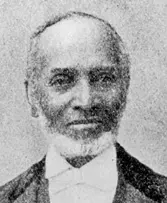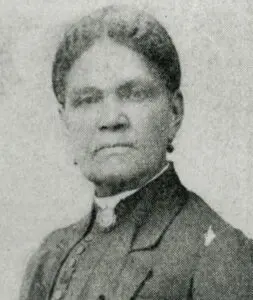Learn about Peter and Sarah Fossett

Peter Fossett was born a slave at Thomas Jefferson’s Monticello – the son of the blacksmith shop manager and the head cook who was a descendent of the Hemings family. Fossett knew that he was different. His grandmother was free, and he was educated with Jefferson’s grandchildren.
Unlike most slaves who were field laborers, Peter worked as a house servant, for which he sometimes received tips. Additionally, his father received a percentage of the shop’s profits. For these reasons, Fossett wore nicer clothes and even sported a silver watch.
Following Jefferson’s death, eleven-year–old Peter, born and reared as free, was put on the auction block with his mother and seven siblings. His father was one of five people who Jefferson freed in his will. Peter was purchased by Colonel John Jones, who ran his plantation differently than Jefferson.
Under threat of whippings, Peter secretly taught fellow slaves to read and write. He also forged papers for fugitive slaves so that it would appear that they were free. He ran away two times but was recaptured both times. Fossett was sold twice more, and at age 35, he was freed through the efforts of his father, family, and Jefferson’s friends.
Related Article: The History of African Americans in Cincinnati

Fossett moved to Cincinnati in 1850 to be with his family. He held several jobs and married Sarah Mayrant, a hairdresser for wealthy white women. The couple joined Union Baptist Church, supported local orphanages, and risked their lives assisting enslaved people on the Underground Railroad.
In 1859, Sarah boarded a streetcar, but the conductor forcibly removed her from the vehicle. She sued the streetcar company, which resulted in Black women being allowed to ride Cincinnati’s streetcars; however, it was several years before Black men were allowed to ride the city’s streetcars.
Related Article: Stories of the Underground Railroad and the Important Ties to Cincinnati
Soon after that, Peter served as a captain in the Black Brigade of Cincinnati, which built defenses for the city along the Ohio River during the Civil War. Sarah became the manager of the Colored Orphan Asylum, a position she held for more than 25 years.
The 1870s were also monumental years for the Fossetts. Peter opened a catering business specializing in the French cooking his mother taught him while a slave at Monticello. He was also ordained as a minister and formed the First Baptist Church in Cumminsville, which was paid for in large part by the Fossetts. He also lobbied for prison reform and sat on the school system’s segregated board of directors.
Related Article: Learn More About our Culture with these Cincinnati Black History Month Events
The Fossetts’ lived in a comfortable, well-furnished, and well–provided home in Cincinnati. They had four children, only one of whom survived to adulthood.
Rev. Fossett pastored for 32 years and ministered to Black people nationwide. He was held in great regard by colored people and was loved by white ministers.
In 1900, believing he would not live much longer, Rev. Fossett returned to Monticello. He died two weeks later and was supposed to be the last surviving slave from Monticello.
In 2023, the Cincinnati Preservation Society dedicated a historical marker to honor Peter and Sarah Fossett at First Baptist Church of Cumminsville.
Sources
Peter Fossett – Wikipedia
19th Century Black Cincinnatians you should know | Cincinnati & Hamilton County Public Library (cincinnatilibrary.org)
About The First 28
The First 28, graciously sponsored by the Greater Cincinnati Foundation, celebrates Black Cincinnatians who were the first in their fields. Each day during Black History Month, we will celebrate athletes, artists, business leaders, civil rights activists, educators, physicians, and politicians.
The Voice of Black Cincinnati is a media company designed to educate, recognize, and create opportunities for African Americans. Want to find local news, events, job posting, scholarships, and a database of local Black-owned businesses? Visit our homepage, explore other articles, subscribe to our newsletter, like our Facebook page, join our Facebook group, and text VOBC to 513-270-3880.
Images provided by Wikipedia and monticello.org
Comments are closed.